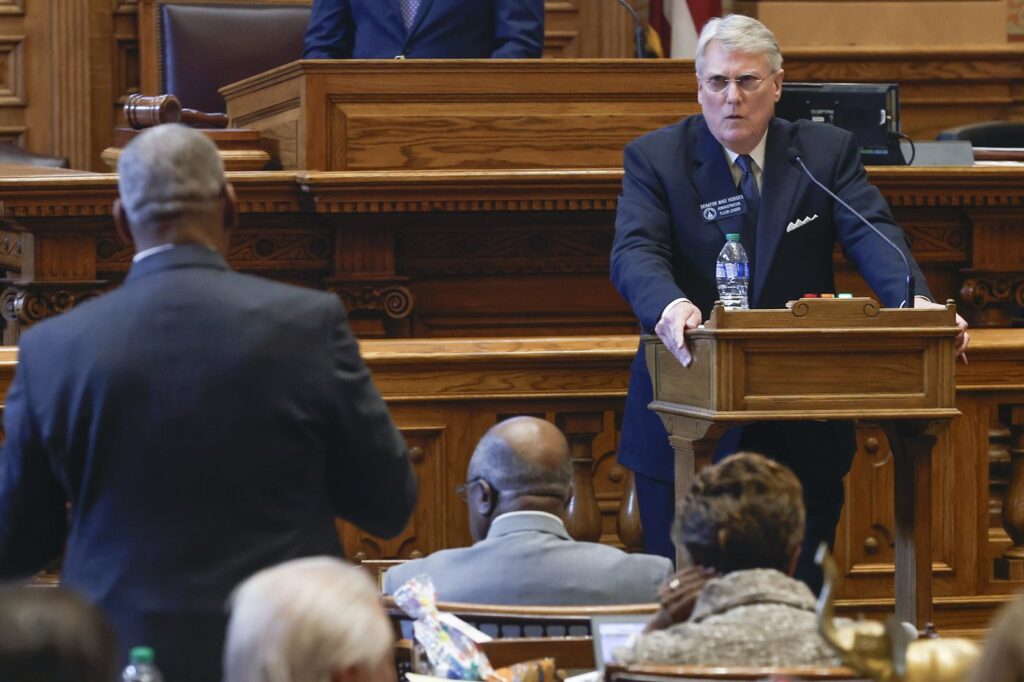

Global HR News
Global HR News
In possible test of federal labour law, Georgia could make it harder for some workers to join unions
February 9, 2024
By
The Associated Press
 Sen. Mike Hodges, R-Brunswick, speaks in favor of Senate Bill 362 at The Georgia State Capitol on Thursday, Feb. 8, 2024. The bill would prevent economic incentives of business that voluntarily recommended unions or share contact information of workers with unions. (Natrice Miller/Atlanta Journal-Constitution via AP)
Sen. Mike Hodges, R-Brunswick, speaks in favor of Senate Bill 362 at The Georgia State Capitol on Thursday, Feb. 8, 2024. The bill would prevent economic incentives of business that voluntarily recommended unions or share contact information of workers with unions. (Natrice Miller/Atlanta Journal-Constitution via AP) ATLANTA (AP) — As Georgia shovels out billions in economic incentives to electric vehicle manufacturers and other companies, the state’s ruling Republicans are moving to make it harder for workers at those firms to join labor unions, in what could be a violation of current federal law.
The state Senate voted 31-23 on Thursday for a bill backed by Gov. Brian Kemp that would bar companies that accept state incentives from recognizing unions without a formal secret-ballot election. That would block unions from winning recognition from a company voluntarily after signing up a majority of workers, in what is usually known as a card check. Senate Bill 362 moves to the House for more debate.
Union leaders and Democrats argue the bill violates 1935’s National Labor Relations Act, which governs union organizing, by blocking part of federal law allowing companies to voluntarily recognize unions that show support from a majority of employees.
“At the end of the day, voluntary recognition is a protected right, period,” said Hannah Perkins, political director for the Georgia AFL-CIO union federation, which claims 500,000 members in the state. Only 4.4% of Georgia workers are union members, the eighth-lowest rate among states.
The National Labor Relations Board, the federal agency overseeing union affairs, did not immediately respond Thursday to an email seeking comment.
Georgia’s bill is modeled after a law passed in Tennessee last year, but there could be similar legislation offered in many other states. The conservative American Legislative Exchange Council is promoting the idea. The national push could also be a response to a decision by the Democratic-controlled NLRB last year that made it easier for unions to organize by card check.
Governors in other Southern states traditionally hostile to organized labor have been speaking out against unions in recent weeks, after the United Auto Workers vowed a fresh push to organize nonunion auto factories after multiple failed attempts.
Alabama Republican Gov. Kay Ivey said her state’s economic success is “under attack.” Henry McMaster, South Carolina’s Republican governor, told lawmakers in the nation’s least unionized state last month that organized labor is such a threat that he would fight unions “ all the way to the gates of hell.”
Georgia Gov. Brian Kemp proclaimed his support for the bill in a January speech to the Georgia Chamber of Commerce, echoing the chamber’s own agenda. He said the move would protect workers’ “right to opportunity” from President Joe Biden’s pro-union agenda and outside forces “who want nothing more than to see the free market brought to a screeching halt.”
Alabama and South Carolina are among five states that in 2010 or 2012 passed state constitutional amendments guaranteeing access to secret union ballots. Indiana, like Tennessee has passed a state law. The National Labor Relations Board challenged the Arizona amendment in court, but a federal judge in 2012 declined to overturn it, saying it was too soon to judge whether the state amendment conflicted with federal law.
Kemp and fellow Georgia Republicans argue that they are protecting workers from being bullied into joining unions by giving them the protection of a secret ballot.
“Why is it such a bad policy to say, if you’re in the state of Georgia, you have a right to be protected, you have a right to choose whether or not to unionize, and you’re not going to get bullied, and you’re not going to get blackmailed?” asked state Sen. Bo Hatchett, a Cornelia Republican who Kemp appointed as one his floor leaders in the Senate.
Democrats, though, say the bill is really about making it harder for unions to organize and for companies to accept them. Most employers who oppose unions require employees voting on organizing to attend mandatory anti-union meetings before a vote, which can cause employees to vote against unions.
“All too often employers are engaging in these scorched-earth campaigns against workers,” said state Sen. Nikki Merritt, a Lawrenceville Democrat who said a union contract protected her in a former job. Like most Senate Democrats Thursday, Merritt wore a red bandanna as a symbol of union solidarity.
State. Sen Mike Hodges, a Brunswick Republican who is sponsoring the bill, denied that it would violate federal law.
“It does not prohibit a company’s employees from unionizing or require an employer to oppose unionization in any action,” said Hodges, another Kemp floor leader.
Hodges said he has a number of relatives who had been union members and understands “the addition to a lifestyle that union wages make.”
“If I thought this bill in any way, shape or form was injurious to unions or to union members, I would not carry it,” Hodges said.
But Democrats said they think the bill is an attempt to attack federal labor law.
“They think that they found a loophole, so they want this to be a test case,” said Sen. Jason Esteves, an Atlanta Democrat. “They want this to go to court because they’re hoping the Supreme Court will allow them to chip away.”
Print this page